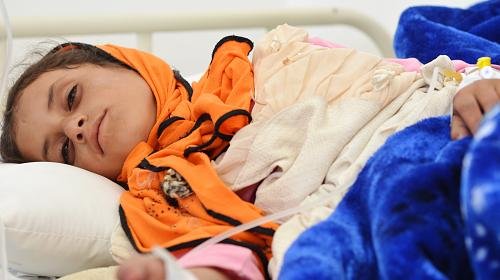By Kate Nichols | Director of Development, CARE USA
SANAA – (December 6, 2018) – As pockets of famine-like conditions are announced in parts of Yemen and the majority of the population are shown to be suffering from emergency or crisis levels of food insecurity, CARE urgently calls for more funding to prevent further catastrophe in Yemen. After almost four years of brutal conflict the country has now reached close to breaking point.
“Today’s report should be a wake-up call for the world,” says Johan Mooij, CARE’s country director in Yemen. “Almost a quarter of a million people would immediately be in famine, and a staggering 20 million people would not have enough to eat here in Yemen without humanitarian assistance – all because of a manmade crisis. The tragedy here grows worse by the day, stretching the limits of what CARE and other humanitarian groups can do to alleviate misery and prevent more deaths.”
According to the just-published Integrated Phase Classification (IPC) report, 240,000 people are living in famine-like conditions in Yemen. Over 70% of the population – 20 million people – are living in emergency or crisis levels of food insecurity, with 9.8 million in need of immediate assistance.
“The areas experiencing catastrophic food insecurity are those affected the most by conflict and fighting,” says Mooij. “We know for example that Hodeidah and Sa’ada governorates have seen the highest levels of airstrikes and ground attacks, and this is where the most severe food insecurity is found. This is the clearest indication of the link between war and famine in Yemen.”
Humanitarian workers at the frontline of the response in Yemen have been witnessing severe malnutrition, hunger and food insecurity for many months now. As Mooij notes; “the vast majority of humanitarian workers are Yemeni, and over the past four years they have been watching their own people starve to death in front of them. Not to mention experiencing increasing hardship themselves.”
Nearly half of Yemen’s population are women and girls, who are bearing the brunt of food insecurity; often giving up meals so that other family members can eat. As more and more men are killed by the ongoing conflict Yemen has also seen an increase in female-headed households. Many women have told CARE staff how soaring food prices and insecurity mean they and their families often go days without eating. One woman – Samira – told CARE field staff how the price of water has increased so much that she can no longer afford to water her crops and grow food to feed her ten children. There are currently around 1.1 million pregnant or breast-feeding women and 1.8 million children who are acutely malnourished, including 400,000 children under five suffering from severe acute malnutrition.
“There is no question that people would be dying faster and in much greater numbers without humanitarian aid,” adds Mooij. “Humanitarian agencies in Yemen like CARE are doing everything they can in unimaginable circumstances to deliver aid to millions of people. CARE is currently helping one million people a month and is willing and able to reach more if funds are available.”
The IPC report also coincides with the announcement of the UN’s biggest ever single country appeal, with a record $4 billion requested to help the people of Yemen. CARE is also calling for an additional $20 million to scale up its food assistance and other humanitarian work. Through cash and voucher transfers CARE supports the most vulnerable and conflict-affected households to meet their basic and immediate needs. CARE is also directly providing food, in partnership with the World Food Programme, in governorates in the north and south of Yemen.
The burden on the Yemeni people is relentless. Aid organizations are desperately trying to fill the gaps, working tirelessly to provide food and supplies to those who have no alternative. “However, we must never forget that humanitarian aid is a short-term solution,” says Mooij. “The only way to turn the tide of suffering for the Yemeni people is to bring an end to the conflict. Warring conflict must engage in good faith with the peace process being led by the UN Special Envoy for Yemen in Sweden. Hunger and famine in Yemen is absolutely caused by war and it can only be stopped by bringing an end to the war.”
CARE has been working across Yemen since 1992 focusing on women’s and youth economic empowerment; prevention of gender-based violence; social inclusion; water resource management; civil society strengthening; good governance; and providing humanitarian assistance. CARE has a long history of implementing both development and humanitarian programming aiming to increase people’s ability to cope with crises and preparedness. CARE overall has 255 international and national staff in Yemen.
Source: https://www.care.org/newsroom/press/press-releases/almost-four-years-conflict-leads-to-declaration-catastrophic-food
Links:
By Kate Nichols | Director of Development, CARE USA
By Kate Nichols | Director of Development, CARE USA
Project reports on GlobalGiving are posted directly to globalgiving.org by Project Leaders as they are completed, generally every 3-4 months. To protect the integrity of these documents, GlobalGiving does not alter them; therefore you may find some language or formatting issues.
If you donate to this project or have donated to this project, you can receive an email when this project posts a report. You can also subscribe for reports without donating.
